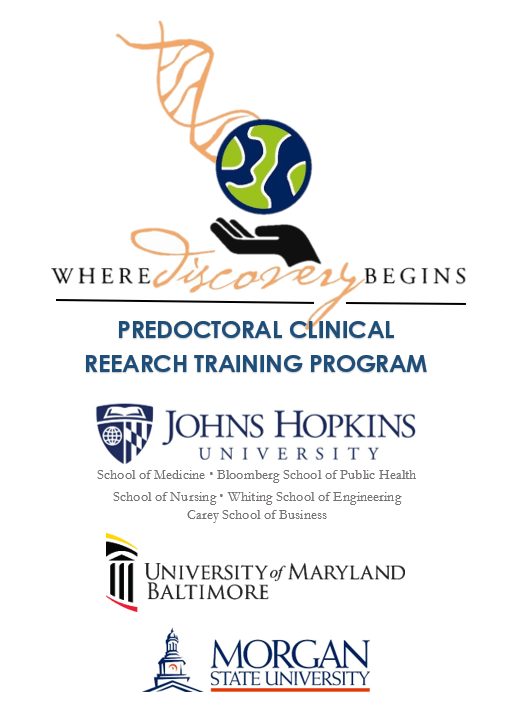Advancing future leadership and excellence in clinical research through training and participation, creativity, scholarship and collaboration
2024-2025 Predoctoral Clinical Research Training Program (PCRTP) T32 application period is closed.
The Predoctoral Clinical Research Training Program (PCRTP) T32 provides training for students in doctoral degree programs (e.g., medicine, nursing, public health), who are interested in pursuing a career in clinical and translational research.
Mission
The mission of the Predoctoral Clinical Research Training Program (PCTRP) T32 is to:
- Offer students an intensive year-long learning experience that prepares them to be exemplary clinical and translational researchers and teachers of research principles and methods.
- Provide clinical research experiences for predoctoral trainees that will stimulate and maintain their interest in a clinical research career during their professional and post-graduate training.
- Enhance curriculum at Johns Hopkins to provide predoctoral trainees with core knowledge, attitudes and skills for lifelong interest and participation in clinical and translational research.
Based out of the Johns Hopkins School of Medicine, this program is a collaborative effort of the Johns Hopkins Schools of Medicine, Bloomberg School of Public Health, Nursing; the Johns Hopkins University Center for BioEngineering Innovation & Design, the University of Maryland Baltimore (UMB) and Morgan State University. Funding is provided by the Johns Hopkins Institute for Clinical and Translational Research (ICTR) through the National Institutes of Health (NIH) National Center for Advancing Translational Sciences (NCATS) through the Clinical and Translational Science Award (CTSA).
What are Clinical and Translational Research?
Clinical research is the practice of systematic inquiry intended to produce knowledge valuable for understanding human disease, preventing and treating illness, and promoting health. In the PCRTP T32, we take a broad view of clinical research that includes several stages along the developmental spectrum of research related to human health. These stages include:
- Pre-clinical research that connects the basic science of disease to human medicine, including research using cell or animal models of disease, human or animal tissues, or computer-assisted simulations of health technologies and interventions.
- Traditional clinical research that involves observational or experimental studies with patients or other human subjects, including clinical trials and studies of human behavior and clinical epidemiology.
- Health services research that evaluates the adoption and delivery of clinical care in hospitals, clinics, and health systems, including studies of the accessibility, utilization, quality, and implementation of health services.
- Public health research that evaluates health outcomes at a community or population level, including studies of the impact of policies, environmental conditions, and the social determinants of health.
Translational research can be thought of in 2 ways. First, it involves the translation of findings across the developmental spectrum of research described above (e.g., pre-clinical to clinical, clinical to health services, etc.). This aspect of translational research involves scientists translating their findings for adoption and further study by other scientists. Second, translational research involves generating research findings that can be translated into applications to improve human health (e.g., translation of research findings into diagnostic and therapeutic interventions, clinical practice guidelines, quality improvement initiatives, community programs, health policy, etc.).
The fields of clinical and translational research are evolving rapidly and require an increasingly sophisticated knowledge base, collaboration among disciplines, and early acquisition of advanced skills. These skills include not only expertise in clinical content and research methods but also broad and innovative thinking, effective communication, and the ability to work in teams and across disciplines. Our goal in the PCRTP T32 is to help scholars begin the process of developing these competencies.
What We Do
PCRTP T32 offers exposure to and training in clinical research for predoctoral trainees during their early professional development. The program centers around a year-long research project and brings trainees together with researchers, mentors, and advisors from a broad array of disciplines, to help them shape their research and address scientific challenges. Trainees have an opportunity to become part of specialized research teams, collaborating across institutions and disciplines, and with colleagues across Maryland and the U.S.
The PCRTP T32 provides both didactic and project-oriented learning to help trainees develop the skills needed for successful careers in clinical and translational research. The program includes opportunities for trainees to present and receive feedback on their research ideas and projects; to share their work with community members; to be part of a multidisciplinary cohort of trainees; to network within their fields of interest and establish formal mentoring relationships; and to learn from experts in areas important for the development of clinical and translational scientists, including data science, team science, implementation science, systems science, community engagement, oral and poster presentations, and scientific writing.
In this unique predoctoral approach to clinical research training, the program helps to focus and prepare young scholars for careers in clinical research, ideally lessening the gap between biomedical discovery and implementation of innovations to improve health.

